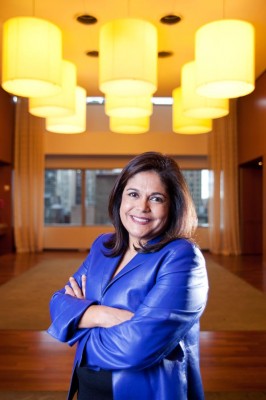Thanks to chief diversity officer Lisa Garcia Quiroz, Time Warner Inc. isn’t just about media. It’s about a message.
Although she grew up in Staten Island, New York, Lisa Garcia Quiroz spent her childhood traveling the world. The daughter of a Puerto Rican mother and a Mexican father, she mingled with world leaders, conversed with newsmakers, and watched mavericks sway as they rocked the proverbial boat—all without leaving her living room, where the TIME magazine on her family’s coffee table was a passport to important people, places, and things. “I grew up with TIME magazine,” Quiroz says. “[Because of that] I always had a great interest in current affairs.”
So, when Quiroz joined Time Inc. in 1990 as a marketing manager for TIME, it wasn’t just a good job. It was a dream job. “I was really excited to be joining the company,” recalls Quiroz, now chief diversity officer and senior vice president of corporate social responsibility at Time Warner Inc. “It was a golden age for magazines, and Time Inc. was—and still is, I believe—the largest magazine company in the world.”
Despite her passion for the TIME brand, Quiroz didn’t intend to be a publisher. The first graduate from her high school to attend Harvard University, she was a sociology major who seemed destined for a career in law. “When I went to college I was really involved with the Latino community,” Quiroz says. “So, if my friends had predicted a career for me it would have been that I would be a civil-rights attorney, or someone who worked as an advocate for underrepresented communities.”

Corporate Social Responsibility | Time Warner Inc.
When she graduated, however, Quiroz didn’t go to law school. Instead, she spent three years working in the Harvard admissions office, where she assisted with minority recruitment. Then, she did something that surprised everyone who knew her: she enrolled in business school, graduating with an MBA in 1990. “I was less interested in the law than in leading an organization,” says Quiroz, who retained her commitment to advocacy in spite of her business ambitions. “When I graduated, I was really clear about the fact that I wanted very much to utilize my business skills in a place where I felt like I could have some impact on the greater good.”
That place turned out to be Time Warner, where Quiroz has spent the past 23 years weaving media and entertainment with social advocacy.
She made her first significant stitch in 1993, when she became founder and general manager of TIME for Kids, a weekly classroom newsmagazine that improves literacy by teaching kids social studies, science, and math in the context of current events. For Quiroz, whose family ingrained in her the value of a good education, it was a golden opportunity. “My grandmother was a very cultured, educated woman who had very little formal education,” Quiroz says. “She came to the United States from Mexico when she was 14 and was adopted by a family in Brooklyn who taught her to read and write. She and my grandfather instilled this incredible sense of achievement in their children, and subsequently in us. The same was true of my mother’s family. For all of us, the key to having a better life was always having an education.”
Quiroz conceived TIME for Kids when Time Inc.—which used an outside vendor to market TIME magazine to high schools and colleges—decided to bring its education marketing in house, under Quiroz’s direction. “When I took on that role it became clear to me that there was an opportunity for TIME magazine to do something for young kids,” Quiroz says. “I felt the magazine could leverage its newsgathering resources around the world to help make sense of news for young people. So, I wrote a memo that I gave to my boss, and then to the publisher of TIME magazine, proposing that we test the idea of TIME for Kids.”
Quiroz spent two and a half years researching and prototyping TIME for Kids, which formally launched in 1995 and today reaches more than 3.2 million students and 136,000 teachers. “TIME for Kids in many ways is still my proudest achievement,” Quiroz says. “I took a risk to do something that I felt combined my intellectual interest in business with my personal passion in education. I built something from the ground up, and you don’t get the chance to do that too often in corporate America.”
Perhaps not. And yet, Quiroz got the chance to do it again in 1997, when she became the launch publisher of People en Español, People magazine’s Spanish-language sibling. “We had never done anything for the US Hispanic market before, and to combine that [business challenge] with my personal passion for the Latino community was a really important opportunity,” Quiroz says. “That magazine was really special because it was a reflection of the passions and interests of the US Latino community. It wasn’t a Mexican import. It wasn’t a Spanish-language translation of an American magazine. It was something that was reflective of the lives that Latinos led in this country, from who we love and admire to who we watch on television to who we listen to on the radio.”
Originally, People en Español was to be a Spanish translation of People. Instead, Quiroz fought to make it an authentic amplification of the Hispanic voice. “My mother and my cousins weren’t interested in reading about Jennifer Aniston in Spanish,” Quiroz says. “They weren’t interested in Friends or English-language television. If they were, they could read about it in English. What they were interested in were the celebrities that spoke to them. They wanted a magazine that was a reflection of their lives.”
Therein lies the power of media, according to Quiroz. “Media influences the people we look up to, it influences how we feel about communities, and it influences how we feel about ourselves,” she says. “I didn’t grow up with Latino role models on television, in national publications, or in movies, so to have an influence on how the next generation will grow up and how they’ll think about themselves is really important to me.”
Although she ceased being publisher of People en Español in 2004, Quiroz continues to have that influence in her current role as Time Warner’s chief diversity officer and senior vice president of corporate social responsibility. Encompassing three different areas—corporate social responsibility, diversity, and multicultural issues, and the Time Warner Foundation—that role coalesces around a vision statement that could easily be the theme for Quiroz’s entire career: “To foster diverse talent and give voice to their exceptional stories.”
Among the initiatives Quiroz currently managers are efforts to support and nurture minority artists in the entertainment industry, including playwrights, screenwriters, and filmmakers; discover, develop, and sponsor diverse talent within Time Warner; and identify new, multicultural markets and audiences for Time Warner’s products, both domestically and internationally. “My charge for this company … is to make sure it has the leadership needed to help it succeed in the 21st century,” Quiroz says. “That means global leadership—people who can be cross-cultural, speak different languages, and create and understand content for different audiences.”
Although she hasn’t decided what her next challenge will be, Quiroz plans to continue supporting and advancing the Hispanic community through involvement in groups such the Hispanic Association for Corporate Responsibility (HACR), in which she is an active member, and the Hispanic Scholarship Fund, which she has served as a board member—currently as vice chair—for 10 years as part of her lifelong commitment to education. “All roads lead to education,” Quiroz says. “You want more Latinos to own homes? You want more Latinos to vote? You want more Latinos to be small business owners? It all goes back to education.”
Check out all of Hispanic Executive‘s 2013 Top 10 Líderes here.
